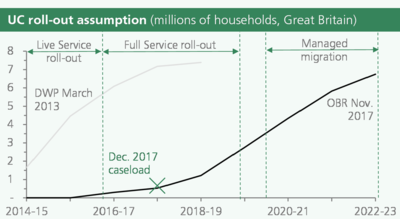The Centre for Social Justice (CSJ) Argues the Case for Universal Credit
Saturday 13 October, 2018 Written by Andy Cook, CEO Centre for Social Justice
A leaked cabinet briefing and a pair of former Prime Ministers have sent Universal Credit (UC) to the top of the news agenda again this week.
The Department for Work and Pensions (DWP) have reported that lone working age parents could be £200 a month worse off under Universal Credit than the old system of working tax credits, while Gordon Brown and John Major both added their criticisms.
First of all, it’s worth debunking some of the misinformation which is driving fear of the system. Anyone currently on tax credits won’t be worse of on UC because of a Government transitional arrangement that makes up the difference between the old benefit and new one. People already receiving government support need to be reassured that this is secure.
Secondly, this revelation is not new. The shortfall is a result of cuts made back in 2015. Those cuts precipitated the resignation of the then Secretary of State for Work and Pensions Iain Duncan Smith, who has been campaigning for more investment in UC ever since.
More concerning this week was the intervention from former Prime Minister Gordon Brown who called for a scrapping of UC and a return to the old system of JSA and working tax credits. This is hardly surprising, Gordon Brown was the principle architect of tax credits. And to think they are a suitable alternative to UC would be a serious revision of history. Let’s never forget what life was like in 2010, before the welfare system was reformed.
The unemployment rate was 8% (today it is half that at 4%), there were 2.5 million people unemployed (today there are just 1.5 million). In 2010 1.4 million people had been on out-of-work welfare for 9 or more of the last 10 years, 670,000 families were claiming more than £15,000 in benefits (far more than what you could earn on minimum wage at the time), income inequality was higher and social mobility in Britain was worse than most other western economies including France, Germany and the USA.
This dire state of affairs was made possible under a system where it paid more to stay unemployed and on welfare than it did to go out and get a job.
And where families were classed as poor according to an arbitrary line, the system ignoring the barriers that prevented them from progressing towards an independent and dignified existence – a stable home life, freedom from debt and addiction, a job that paid a proper salary and an opportunity to up-skill.
The old system did more to keep people trapped in a state of subservience to Government handouts than it did to help free people so that they could reach their own potential. I know this because I started a charity to pick up the pieces where the welfare state had failed so abjectly.
Compare this to UC. It is rolling out across the country and the results that have come back so far are hugely promising. Claimants on UC are almost 7 per cent more likely to have been in work at any point within 6 months of claiming when compared to claimants on the old system. Those claimants of UC were also more likely to be earning more from their job than people still in the old system. And let’s not ever lose sight of the fact that employment in this country has reached record highs – with more than 3m more people in work today compared to when Gordon Brown was in power. This is important because work is the best route out of poverty, a job reduces the chance of falling in to poverty by 75 per cent.
Yes, UC is a major welfare reform that will affect millions of people up and down Britain. And we expect there to be some roll-out issues. But while the launch of tax credit plunged millions into debt overnight, the test and learn model being deployed by DWP will allow for changes to be made as we learn which areas of UC need improvement. The 2017 budget saw exactly that happen with changes to initial waiting days and housing payments. More money needs to be invested in UC, to replace the cuts made by George Osborne in the 2015 budget, that is right and fair.
If Gordon Brown was genuinely interested in helping solve poverty in this country, he’d get behind UC. People’s lives aren’t political footballs for retired politicians.
Scrapping UC now would be a disservice to those people who deserve more than a life stuck on benefits. It is time to invest.
ABC Note: The Centre for Social Justice (CSJ) is an independent centre-right think tank co-founded in 2004 by Iain Duncan Smith and Tim Montgomerie. In 2015 the Chancellor, George Osborne, announced a future £5 billion a year cut to the Universal Credit budget after his attempt to cut Tax Credits that year was thwarted by parliament.The Resolution Foundation has argued that this cut, which will be felt more keenly as millions more people transfer to Universal Credit, risks the new system failing to achieve its original purpose of incentivising work in low-income households.

ABC Comment, have your say below:

Leave a comment
Make sure you enter all the required information, indicated by an asterisk (*). HTML code is not allowed.
Join
FREE
Here










